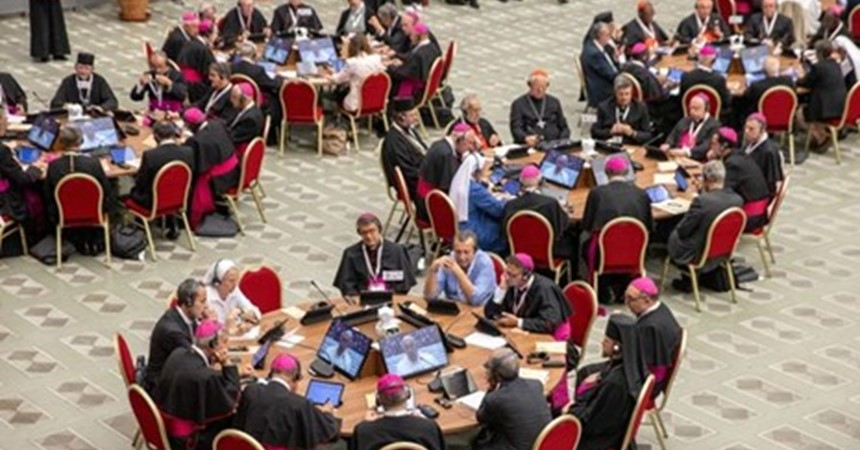How simple these commandments sound and yet how we struggle to enact them each day. We are called to simply imitate Jesus Christ.
This brings me to the Letter of the XVI Ordinary General Assembly of the Synod of Bishops to the People of God, released on 25 October 2023.
Of course, it refers to synodality, to listening and to discernment. For the first time, at Pope Francis’ invitation, men and women were invited, by virtue of their baptism, to sit at the same table with the Assembly of Bishops for discussions and for voting. All this took place when the world is in crisis, when justice and peace seem to be a far-off reality, when we feel the wounds of violence.
I share with you the paragraphs towards the end of the letter which talk about discernment and listening. I am sure this will resonate closely for those of us who have been part of our synodal journey in the Diocese of Maitland-Newcastle for the past 30 years.
To progress in its discernment, the Church absolutely needs to listen to everyone, starting with the poorest. This requires a path of conversion on its part, which is also a path of praise: “I thank you, Father, Lord of heaven and earth, that you have hidden these things from the wise and understanding and revealed them to little children” (Luke 10:21)! It means listening to those who have been denied the right to speak in society or who feel excluded, even by the Church; listening to people who are victims of racism in all its forms – in particular in some regions to indigenous peoples whose cultures have been scorned. Above all, the Church of our time has the duty to listen, in a spirit of conversion, to those who have been victims of abuse committed by members of the ecclesial body, and to commit herself concretely and structurally to ensuring that this does not happen again.
The Church also needs to listen to the laity, women and men, all called to holiness by virtue of their baptismal vocation: to the testimony of catechists, who in many situations are the first proclaimers of the Gospel; to the simplicity and vivacity of children, the enthusiasm of youth, to their questions, and their pleas; to the dreams, the wisdom and the memory of elderly people. The Church needs to listen to families, to their educational concerns, to the Christian witness they offer in today's world. She needs to welcome the voice of those who want to be involved in lay ministries and to participate in discernment and decision-making structures.
To progress further in synodal discernment, the Church particularly needs to gather even more the words and experience of the ordained ministers: priests, the primary collaborators of the bishops, whose sacramental ministry is indispensable for the life of the whole body; deacons, who, through their ministry, signify the care of the entire Church for the most vulnerable. She also needs to let herself be questioned by the prophetic voice of consecrated life, the watchful sentinel of the Spirit’s call. She also needs to be attentive to all those who do not share her faith but are seeking the truth, and in whom the Spirit, who “offers everyone the possibility of being associated with this paschal mystery” (Gaudium et Spes 22, 5), is also present and operative.
I hope you are able to identify yourself in the lists of those who need to be listened to. One of the struggles of the Diocesan Synod Working Party, when it existed, before the death of Bishop Bill, was our capacity to listen to such a diversity of voices, especially those who were disconnected from our worshipping communities. And yet it seems to me that this has been an ongoing struggle, particularly if you listen to Sunday’s First Reading from the book of Exodus (22:20-26) in which God, speaking to Moses, provides instructions as to how to live by taking care of those who are ‘outsiders’. While the Book of Exodus was written between 600 and 500 BCE, it was set roughly around 1300 BCE. So here we are, still struggling with how to be inclusive and invite people into God’s loving embrace, some 3,500 years later.
To go back to the letter from the Synod on Synodality:
Day by day, we felt the pressing call to pastoral and missionary conversion. For the Church’s vocation is to proclaim the Gospel not by focusing on itself, but by placing itself at the service of the infinite love with which God loved the world (cf. John 3:16). When homeless people near St. Peter’s Square were asked about their expectations regarding the Church on the occasion of this synod, they replied: “Love!”. This love must always remain the ardent heart of the Church, a Trinitarian and Eucharistic love, as the Pope recalled on October 15, midway through our assembly, invoking the message of Saint Thérèse of the Child Jesus. It is “trust” that gives us the audacity and inner freedom that we experienced, not hesitating to freely and humbly express our convergences, differences, desires and questions.
Our focus must be outward looking. I am sure God gazes upon us daily, with the love and delight of the creator, similar to how parents gaze upon their newborn. I think this is how we are being asked to encounter our world with its mystery and majesty.
Let’s hope that the next twelve months of the ‘big’ synodal journey will be fruitful, not only for the Catholic Church but for our global community. Please keep praying.
Follow mnnews.today on Facebook.

